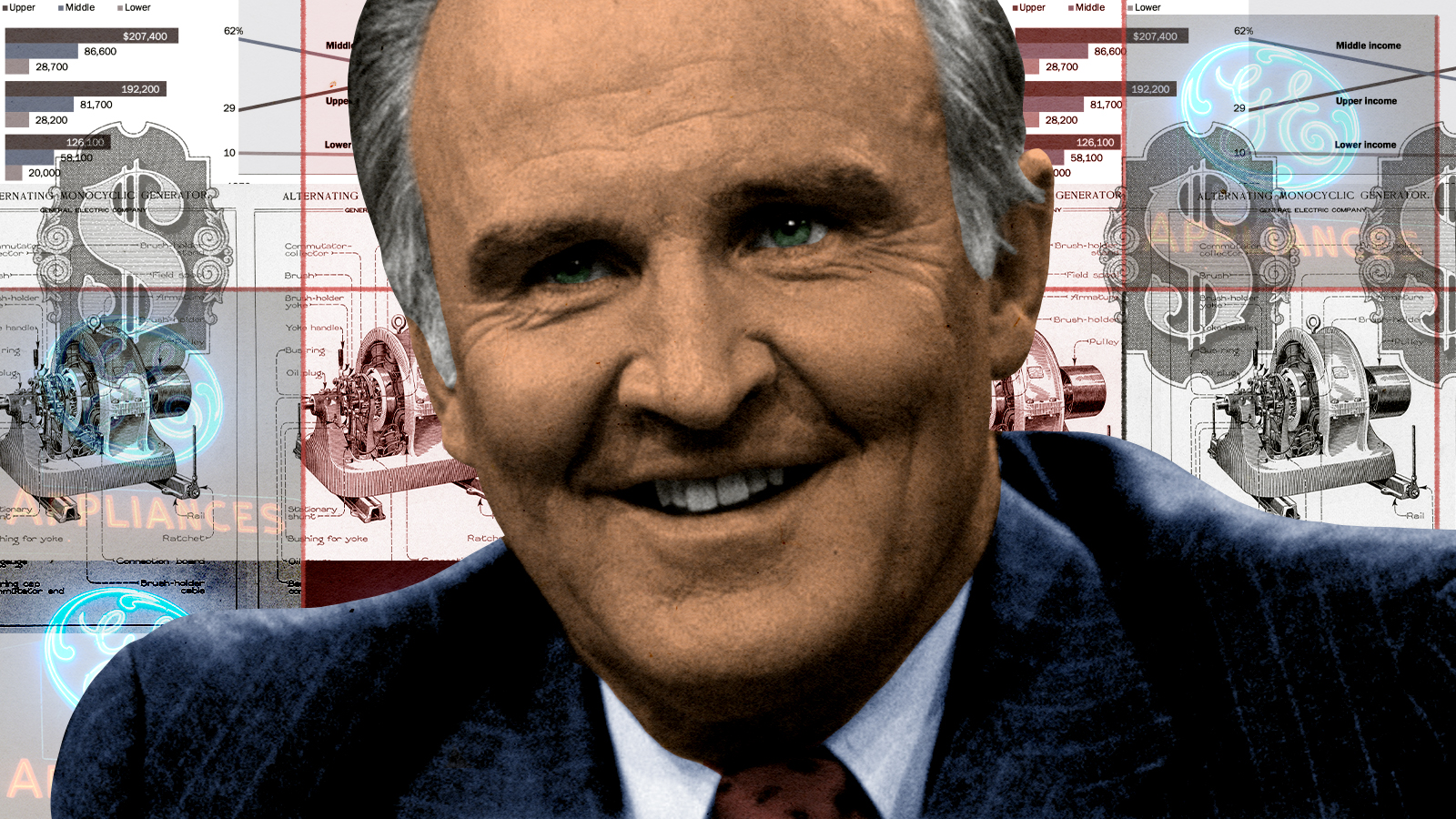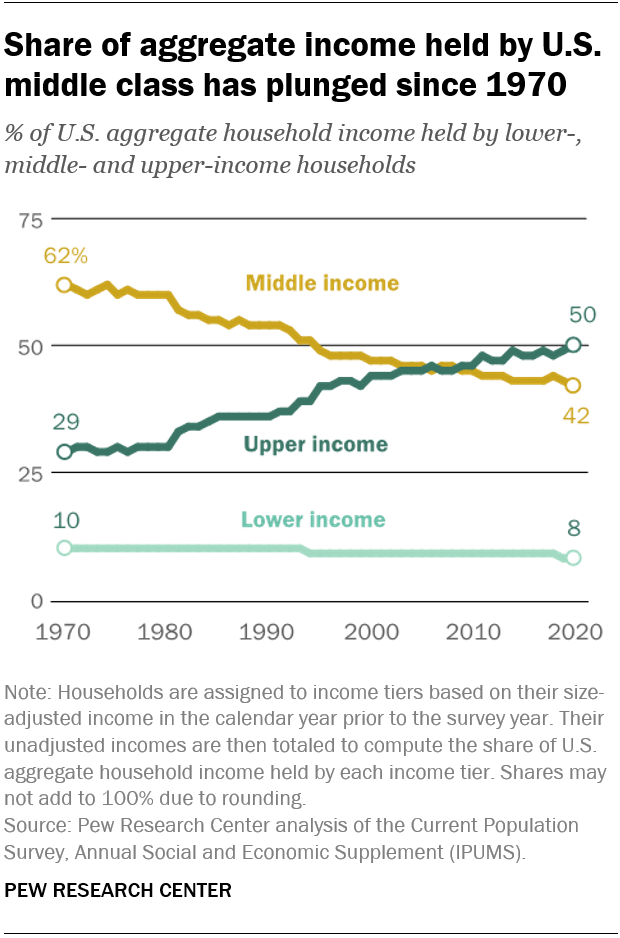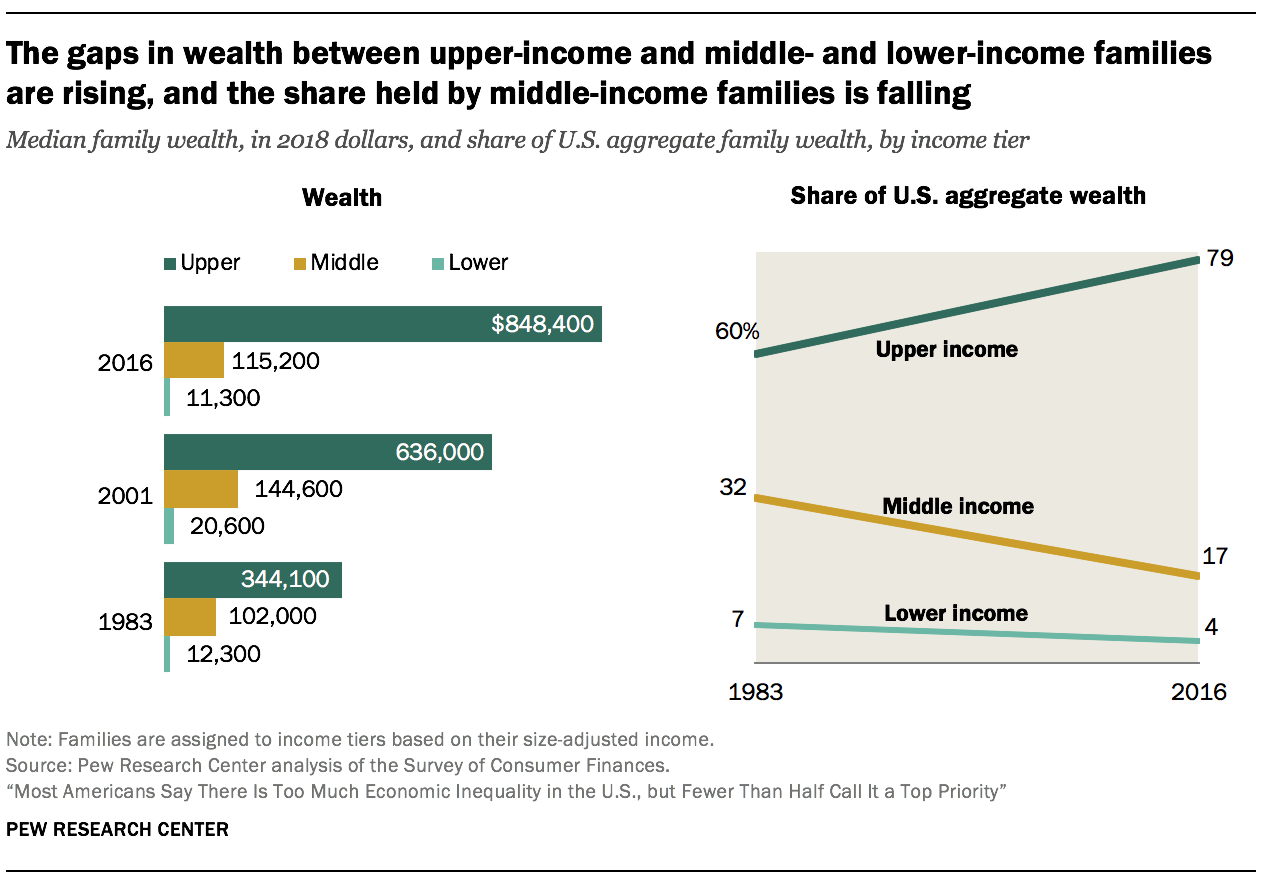Is a single man largely responsible for America's wealth gap?
How Jack Welch helped create the America of Donald Trump, Jeff Bezos, and Elon Musk


A free daily email with the biggest news stories of the day – and the best features from TheWeek.com
You are now subscribed
Your newsletter sign-up was successful
The gap between America's rich and the poor — or really, the rich and everyone else — has stretched into a chasm. That's fairly indisputable. The current divergence between the wealthiest Americans and the lower 90 percent of earners began in the late 1970s, after a post-World War II era of rising wages and not-outlandish differences in pay between workers and management.

The disparity in wealth is even starker.

A new book by financial journalist David Gelles pins much of the blame for this wealth and income disparity on one man: Jack Welch, the head of General Electric from 1981 to 2001. Welch, who died in 2020, not only widened the gulf between rich and not rich, he also "broke capitalism," Gelles argues. Here's everything you need to know:
The Week
Escape your echo chamber. Get the facts behind the news, plus analysis from multiple perspectives.

Sign up for The Week's Free Newsletters
From our morning news briefing to a weekly Good News Newsletter, get the best of The Week delivered directly to your inbox.
From our morning news briefing to a weekly Good News Newsletter, get the best of The Week delivered directly to your inbox.
Who was Welch, and why single him out?
Welch joined GE's plastics division in 1960, just after earning his doctorate in chemical engineering, and he rose quickly through the management chain until he was elevated to chairman and CEO in 1981.
"GE was an industrial company when he took over — making most of its money selling appliances, light bulbs, power turbines, and jet engines," Gelles writes in The New York Times. By the time he left, dozens of acquisitions later, it was a hydra-like conglomerate encompassing everything from medical devices to aviation and NBC, buoyed by profits from GE Capital, "which was essentially a giant unregulated bank."
Soon after becoming CEO, Welch "closed factories and fired employees by the tens of thousands, unleashing a series of mass layoffs that destabilized the American working class," Gelles writes. "He devised systems like 'stack ranking,' which mandated that the bottom 10 percent of workers be fired each year," and "he embraced offshoring and outsourcing."
"Up until this point, people who had a job at a company like GE or IBM basically figured that they had a job for life," Gelles told NPR. "But he explicitly said that this notion was going to be a thing of the past under his watch."
A free daily email with the biggest news stories of the day – and the best features from TheWeek.com
How did all that widen the wealth gap?
For decades after World War II, big American companies took pride in how much they paid employees and the government — "and GE is a perfect example of this," Gelles told NPR's Fresh Air, pointing to GE's 1953 annual report "where they brag about how much they're paying in salaries to their workers."
"That changed with the ascendance of men like Jack Welch," Gelles told the Times' David Leonhardt. "Profits began flowing not back to workers in the form of higher wages, but to big investors in the form of stock buybacks. And GE began doing everything it could to pay as little in taxes as possible."
Welch's predecessor at GE, Reginald Jones, earned about $743,000 a year in today's dollar — "12 or 13 times what new management recruits to the company took home," Gelles writes in his book. Chief executives at 300 large U.S. companies raked in an average of $10.6 million in 2021, according to a new report from the Institute for Policy Studies. "The average gap between CEO and median worker pay in our sample jumped to 670 to 1, up from 604 to 1 in 2020. Forty-nine firms had ratios above 1,000 to 1."

Does the wealth gap persist?
Absolutely. And not only did the CEO-worker pay gap grow in 2021, the ISP report found, but Welch-style stakeholder primacy is alive and well. "Of the 106 companies in our sample where median worker pay did not keep pace with inflation, 67 percent spent money on stock buybacks, a maneuver that inflates executive stock-based pay," ISP reports. "With the $13 billion Lowes alone spent on share repurchases, the company could have given each of its 325,000 employees a $40,000 raise. Instead, its median pay fell 7.6 percent to $22,697."
You can see the wealth gap in the latest earnings reports, too, which show that "while wealthier shoppers continue to splurge, low-income shoppers have pulled back faster than expected in the past two months," The Associated Press reports. "The pullback among low-income shoppers has not affected overall spending, which is still up." But the upward flow of wealth is bad for the economy, not just the poor and middle class, according to a new report from the Economic Policy Institute.
Decades of massive wealth disparity had cost the U.S. about 1.5 percent of economic growth, or more than $300 billion, by the end of 2018, the EPI report found. That's because lower-earning Americans spend a greater share of their disposable income than wealthier people, who save their excess earnings or park it in investments. So when most of the wealth goes to the richest 1 percent, or 0.01 percent, the lack of consumption by the other 99 percent of Americans is a drag on the economy.
Is it fair to blame this on Welch?
Welch certainly wasn't working in a vacuum. By the time he was elevated to CEO, economist Milton Friedman had been arguing for years that "the social responsibility of business is to increase its profits." Welch also took the reins at GE just months after President Ronald Reagan, whose devotion to supply-side "trickle-down" economics was in many ways a federal policy analog to Welch's management revolution.
"Jack Welch was unquestionably an important and emblematic figure in America's paradigm shift, but Gelles takes his book title too literally, pushes it too strenuously," Kurt Andersen writes at The New York Times. "Whenever he refers to the post-1980 economic regime," for example, "he uses his own word, 'Welchism,' instead of libertarianism or neoliberalism or any of the other familiar terms" that might broaden the blame to, say, all the presidents from Reagan on who "bought into libertarian economics."
Does Gelles have a response to that critique?
Yes. Other figures — Reagan, Friedman, future Supreme Court Justice Lewis Powell — had laid an intellectual and political groundwork for Welch's corporate revolution, "but it was only when Jack took over GE that we actually saw what that ideology looked like in practice," Gelles told Just Capital. "He was the one with his singular mix of ambition and a sense of impunity, and control of one of the largest and arguably the most influential company in the country. He was able to not only radically transform and reset norms at GE, which was this standard-bearer, but because of that influence, also bring the rest of the economy along for the ride, essentially setting a new standard by which CEOs and executives were evaluated."
"This was one of those moments when an exceptional individual at a critical moment really goes on to shape the world," he told Leonhardt.
Is Welch's management style still ascendant?
It actually hasn't aged very well. Welch did grow GE from a $14 billion corporate titan to the most valuable company in the world in 2001, worth $600 billion. And "for a time in the early 2000s, five of the top 30 companies in the Dow Jones Industrial Average were run by men who had worked for Mr. Welch," Gelles writes in the Times. But "the Welch protégés who struck out on their own rarely fared well." And neither did GE.
Soon after Welch retired, "GE fell to the point of essential irrelevance in the American economy," Gelles tells NPR. "In 2018, with all of Welch's bad decisions catching up with the company, GE was removed from the Dow Jones Industrial Average, the bluest of blue-chip indexes and a real bellwether of the American economy." The company broke itself apart last year.
After decades of corporate belief that "greed, for lack of a better word, was good for the country," Christiaan Hetzner writes at Fortune, "an increasing number of boardrooms are discovering that being a good corporate citizen can be its own reward," a movement called stakeholder capitalism. "The move away from the Reagan era of unfettered free markets toward an emphasis on prudent and proportionate regulation has, however, spooked prominent Republicans, who are now retaliating by labeling the shift 'woke,'" he adds.
They needn't worry too much: Welch established "a powerful and lasting influence on American business, informing how workers are treated, how shareholders are rewarded, and how CEOs comport themselves in an increasingly divisive age," Gelles writes in the Times. "When Donald J. Trump is elected president, when Jeff Bezos argues about inflation with the White House, when Elon Musk negotiates his $44 billion deal to buy Twitter by using the poop emoji — this is the world that Jack Welch helped create."
Peter has worked as a news and culture writer and editor at The Week since the site's launch in 2008. He covers politics, world affairs, religion and cultural currents. His journalism career began as a copy editor at a financial newswire and has included editorial positions at The New York Times Magazine, Facts on File, and Oregon State University.
